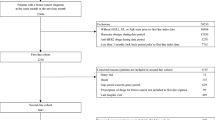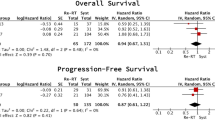Abstract
Background
We characterized the risk factors and survival of metastatic breast cancer (MBC) patients with brain metastases (BrM) as the first and only site of disease in a large, retrospective cohort.
Methods
MBC patients treated for BrM with radiation at a quaternary institution between 2005 and 2019 were identified. MBC patients with BrM but without concurrent extracranial metastases (ECM) or leptomeningeal disease (LMD) were classified as brain-only. Factors associated with brain-only MBC, brain-specific progression free survival (bsPFS) and overall survival (OS) were investigated.
Results
A total of 691 patients with MBC and BrM were analyzed. Among them, 67 patients (9.7%, n = 67/691) presented with brain-only MBC without concurrent ECM/LMD. Within this subgroup, 40 patients (5.8%, n = 40/691) remained free of any ECM or LMD, while 17 patients (2.5%) developed LMD, and 10 patients (1.4%%) developed ECM with a median follow-up of 8 months (IQR 2–35). Patients with brain-only MBC were more likely to have a single BrM [OR 3.41 (1.62–7.19), p = 0.001] and either HER2+ [OR 3.3 (1.13–9.65), p = 0.03] or TNBC [OR 4.09 (1.42–11.74), p = 0.009] subtypes. Patients who presented with brain-only MBC also had significantly longer OS [HR 0.45, (0.22–0.86), p = 0.008] and a trend toward longer bsPFS [HR 0.67 (0.44–1.03), p = 0.05] compared to those with concurrent ECM/LMD.
Conclusion
Patients with brain-only MBC had a longer bsPFS and OS than those with ECM. Patients with HER2+ and TNBC were more likely to have brain-only disease compared to those with HR+/HER2- MBC.

Similar content being viewed by others
Data availability
The datasets generated during and/or analyzed during the current study are available from the corresponding author on reasonable request.
References
Kuksis M, Gao Y, Tran W, Hoey C, Kiss A, Komorowski A et al (2021) The incidence of brain metastases among patients with metastatic breast cancer: a systematic review and meta-analysis. Neurooncology 23(6):894–904
Gao Y, Kuksis M, Said Id, Chehade B, Kiss R, Tran AW (2021) Treatment patterns and outcomes of women with symptomatic and asymptomatic breast cancer brain metastases: a single-center retrospective study. Oncologist 26(11):e1951–e1961
Wang X, Rosen M, Chehade R, Sahgal A, Das S, Warner E et al (2022) Analysis of rates of brain metastases and association with breast cancer subtypes in Ontario, Canada. JAMA Netw Open 5(8):e2225424–e2225424
Kim YJ, Kim JS, Kim IA (2018) Molecular subtype predicts incidence and prognosis of brain metastasis from breast cancer in SEER database. J Cancer Res Clin Oncol 144(9):1803–1816
Gabos Z, Sinha R, Hanson J, Chauhan N, Hugh J, Mackey JR et al (2006) Prognostic significance of human epidermal growth factor receptor positivity for the development of brain metastasis after newly diagnosed breast cancer. J Clin Oncol 24(36):5658–5663
Suh J, Kotecha R, Chao S, Ahluwalia M, Sahgal A, Chang E et al (2020) Current approaches to the management of brain metastases. Nat Rev Clin Oncol 17(5):279–299
Soliman H, Das S, Larson D, Sahgal A (2016) Stereotactic radiosurgery (SRS) in the modern management of patients with brain metastases. Oncotarget 7(11):12318
Myrehaug S, Soliman H, Ruschin M, Tseng C, Tsao M, Sahgal A (2017) Clinical outcomes for frameless image-guided stereotactic radiation therapy to intact brain metastases in five daily hypofractionated treatments. Int J Radiat Oncol Biol Phys 99(2):E96–E97
Krop I, Lin N, Blackwell K, Guardino E, Huober J, Lu M et al (2015) Trastuzumab emtansine (T-DM1) versus lapatinib plus capecitabine in patients with HER2-positive metastatic breast cancer and central nervous system metastases: a retrospective, exploratory analysis in EMILIA. Ann Oncol 26(1):113–119
Montemurro F, Delaloge S, Barrios C, Wuerstlein R, Anton A, Brain E et al (2020) Trastuzumab emtansine (T-DM1) in patients with HER2-positive metastatic breast cancer and brain metastases: exploratory final analysis of cohort 1 from KAMILLA, a single-arm phase IIIb clinical trial☆. Ann Oncol 31(10):1350–1358
Lin N, Borges V, Anders C, Murthy R, Paplomata E, Hamilton E et al (2020) Intracranial efficacy and survival with tucatinib plus trastuzumab and capecitabine for previously treated HER2-positive breast cancer with brain metastases in the HER2CLIMB trial. Am Soc Clin Oncol. https://doi.org/10.1200/JCO.20.00775
Sperduto P, Mesko S, Li J, Cagney D, Aizer A, Lin N et al (2020) Beyond an updated graded prognostic assessment (breast GPA): a prognostic index and trends in treatment and survival in breast cancer brain metastases from 1985 to today. Int J Radiat Oncol* Biol* Phys 107(2):334–343
Thomas A, Rhoads A, Pinkerton E, Schroeder MC, Conway KM, Hundley W et al (2019) Incidence and survival among young women with stage I–III breast cancer: SEER 2000–2015. JNCI Cancer Spectrum 3(3):pkz040
Kaur M, Joshu CE, Visvanathan K, Connor AE (2022) Trends in breast cancer incidence rates by race/ethnicity: patterns by stage, socioeconomic position, and geography in the United States, 1999–2017. Cancer 128(5):1015–1023
Shewade A, Hsieh A, Mani A, Al-Sakaff N, Sanglier T, Taylor M et al (2018) Real-World (RW) characteristics, treatment (tx) patterns, and overall survival (OS) in US patients (pts) with metastatic breast cancer (mBC) and CNS metastases (CNS mets). J Clin Oncol. https://doi.org/10.1200/JCO.2018.36.15_suppl.1037
Berghoff A, Bago-Horvath Z, Ilhan-Mutlu A, Magerle M, Dieckmann K, Marosi C et al (2012) Brain-only metastatic breast cancer is a distinct clinical entity characterised by favourable median overall survival time and a high rate of long-term survivors. Br J Cancer 107(9):1454–1458
Boogerd W, Vos V, Hart A, Baris G (1993) Brain metastases in breast cancer; natural history, prognostic factors and outcome. J Neurooncol 15(2):165–174
Niwińska A, Pogoda K, Murawska M, Niwiński P (2011) Factors influencing survival in patients with breast cancer and single or solitary brain metastasis. Eur J Surg Oncol (EJSO) 37(7):635–642
Dawood S, Lei X, Litton J, Buchholz T, Hortobagyi G, Gonzalez-Angulo A (2012) Incidence of brain metastases as a first site of recurrence among women with triple receptor–negative breast cancer. Cancer 118(19):4652–4659
Pestalozzi B, Zahrieh D, Price K, Holmberg S, Lindtner J, Collins J et al (2006) Identifying breast cancer patients at risk for central nervous system (CNS) metastases in trials of the International Breast Cancer Study Group (IBCSG). Ann Oncol 17:935–944
Core Team R (2021) R: A language and environment for statistical computing. R Foundation for Statistical Computing, Vienna, Austria. https://www.R-project.org/
Bailleux C, Eberst L, Bachelot T (2021) Treatment strategies for breast cancer brain metastases. Br J Cancer 124(1):142–155
Al-Mahmood S, Sapiezynski J, Garbuzenko OB, Minko T (2018) Metastatic and triple-negative breast cancer: challenges and treatment options. Drug Deliv Transl Res 8:1483–1507
Funding
The authors declare that no funds, grants, or other support were received during the preparation of this manuscript.
Author information
Authors and Affiliations
Contributions
All authors contributed to the study conception and design. Material preparation, data collection and analysis were performed by BIS, KJ, HS and VM. The first draft of the manuscript was written by BIS and all authors commented on previous versions of the manuscript. All authors read and approved the final manuscript.
Corresponding author
Ethics declarations
Competing interests
CLT (advisor: Sanofi, Elekta MR-linac consortium), AJ (advisor: Gamma Knife Icon, honoraria: Astra Zeneca, BrainLAB, Elekta AB; grant: Elekta, BrainLAB, Varian), KJJ (advisor: Amgen, AzstraZeneca, Apo Biologix, Eli Lily, Esai, Genomic Health, Knight Therapeutics, Merck. Myriad Genetics Inc, Novartis, Purdue Pharma, Pfizer, Roche, Seagen; grant: Aztra Zeneca, Eli Lilly, Seagen), BI, HS, VM, SM, JD, EW (none).
Ethical approval
This study received REB approval prior to study initiation.
Consent to participate
Informed consent was obtained from all individual participants included in the study.
Consent to publish
N/A.
Additional information
Publisher’s Note
Springer Nature remains neutral with regard to jurisdictional claims in published maps and institutional affiliations.
Supplementary Information
Below is the link to the electronic supplementary material.
Rights and permissions
Springer Nature or its licensor (e.g. a society or other partner) holds exclusive rights to this article under a publishing agreement with the author(s) or other rightsholder(s); author self-archiving of the accepted manuscript version of this article is solely governed by the terms of such publishing agreement and applicable law.
About this article
Cite this article
Id Said, B., Soliman, H., Moravan, V. et al. Patterns of treatment and outcomes of patients with brain-only metastatic breast cancer. J Neurooncol 164, 437–445 (2023). https://doi.org/10.1007/s11060-023-04421-4
Received:
Accepted:
Published:
Issue Date:
DOI: https://doi.org/10.1007/s11060-023-04421-4




